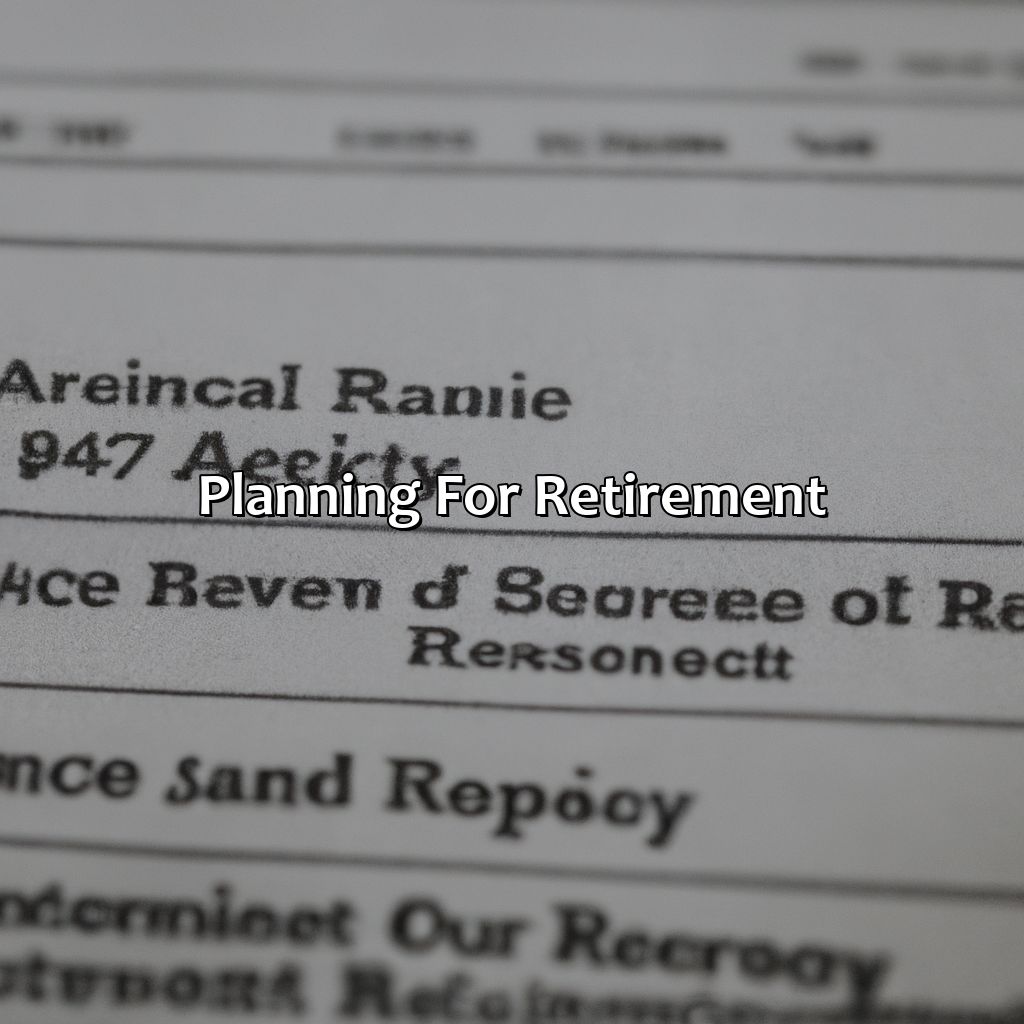How Much Money Do You Get In Retirement?
Key Takeaway:
- Retirement income can come from various sources, including social security benefits, pension benefits, and personal savings. It’s important to have a diversified retirement income plan.
- Social security benefits can be a significant part of retirement income for many people. Understanding the rules and claiming strategies can help maximize these benefits.
- When planning for retirement, it’s important to factor in both basic living expenses and expected healthcare and leisure expenses. Calculating retirement income needs and starting to save early are crucial steps in creating a successful retirement plan.
Are you concerned about your retirement finances? You don’t have to worry any longer. This article will help you understand how much money you can expect to receive in retirement. You’ll gain insight into the different factors that affect your retirement income.
Retirement Income
To have confidence in your retirement income plan, it’s essential to understand the sources you can depend on. In this “Retirement Income” section, you’ll gain an understanding of the four main sources that guarantee financial security in retirement. These subsections include:
- “Sources of Retirement Income,”
- “Social Security Benefits,”
- “Pension Benefits,” and
- “Personal Savings.”

Image credits: retiregenz.com by Harry Washington
Sources of Retirement Income
Retirees can enjoy a steady stream of income from various sources. Having multiple sources helps to ensure a comfortable and worry-free retirement life. Here are some different categories of potential livelihoods:
- Government Benefits: Pensions, Old Age Security, Guaranteed Income Supplement, and other public benefits.
- Savings and Investments: Savings accounts, Registered Retirement Savings Plans (RRSPs), Tax-Free Savings Accounts (TFSAs), mutual funds, stocks, and real estate investments.
- Company Pension Plans: Defined benefit or defined contribution plans offered by employers that match contributions.
- Annuities: An annuity is a contract that guarantees a fixed or variable payment in exchange for an investment sum. They can also be offered by insurance companies or investment firms.
Other factors such as geographic location, health status, family support systems may also impact one’s retirement income. It is critical to start planning early and seeking professional advice for long-term success.
Don’t let the lack of proper planning lead you to decline in financial freedom during retirement. Properly planning your retirement avenues gives you peace of mind while satisfying basic needs post-retirement. Start availing any possible benefits and investing in some secure schemes now.
Social Security benefits: Like a participation trophy for surviving to old age.
Social Security Benefits
The following are types of benefits paid by Social Security:
- Retirement Benefits: These benefits are paid to people who have reached a certain age and have earned enough credits through their work history. The amount of benefit paid depends on the individual’s lifetime earnings.
- Disability Benefits: These benefits are paid to people who have worked and contributed to Social Security but can no longer work due to a severe medical condition.
- Survivor Benefits: These benefits are paid to the surviving family members of a deceased worker who has earned enough credits through their work history.
It is important to note that Social Security Benefits alone may not be enough for retirement income, and individuals should supplement with other sources such as personal savings or pensions.
A recent study by the Social Security Administration found that over 65% of seniors rely on Social Security for more than half of their income in retirement.
Source: https://www.ssa.gov/policy/docs/ssb/v71n4/v71n4p1.html
You know you’re retired when the highlight of your day is checking your bank account for your pension deposit.
Pension Benefits
First, Pension Benefits are typically provided by the employer or government and are based on the individual’s employment history and contributions to the plan.
Second, the amount of Pension Benefits a retiree receives is calculated based on a formula that takes into account factors like years of service, salary level, and contribution amounts.
Finally, some pension plans may offer different types of benefits such as survivor benefits for a spouse or disability benefits for retirees who become ill or injured.
It’s essential to note that not all employees are eligible for Pension Benefits and that the amount they receive can vary widely depending on their individual circumstances.
Many retirees have shared touching stories about how Pension Benefits have supported them in their twilight years. The peace of mind that comes with knowing they’ll have reliable income allows them to enjoy their retirement fully.
Saving for retirement is like preparing for a marathon, except you don’t know if the finish line is 50 or 90 years away.
Personal Savings
Investing in yourself is the key to personal financial growth. Accumulating a pool of funds specifically designated for your retirement is known as “Independent Retirement Savings.” These savings account types let you manage contribution and withdrawal frequently.
The best method of money-making will depend on how much you earn, save or borrow, and your risk tolerance. These self-financed savings enable retirees to pay their bills without any significant impact on their existing income sources.
Remember that IRA contributions may help trim down taxes this year, but they’ll still be subject to tax when distributed in retirement years. Also, it’s vital to keep some cash reserves for variable expenses like healthcare costs while planning for good pension schemes.
Pro Tip: No matter how far from retirement age, starting early yields immense benefits in money management, and owning an array of investments could significantly boost returns over time.
Retirement expenses: where the only thing higher than your age is your medical bills.
Retirement Expenses
Retirement Expenses – this section offers a detailed understanding of estimated costs. Its subsections are:
- Basic Living Expenses
- Healthcare Expenses
- Travel and Leisure Expenses
Get a closer look at each part to aid in retirement expense planning.

Image credits: retiregenz.com by David Arnold
Basic Living Expenses
The fundamental costs of living in retirement refer to the essential but straightforward financial requirements needed for survival. They comprise housing, food, utilities like water and electricity, clothing, healthcare costs, and transportation. In most cases, these expenses are non-negotiable since they support daily living standards. Without meeting these expenses, seniors may experience dire consequences.
These basic expenses vary depending on an individual’s location and lifestyle choices. For example, a retiree residing in a metropolitan city will experience higher prices compared to rural areas. Similarly, one who loves traveling frequently will require more money compared to one who enjoys staying at home.
It is also worth noting that retirees might face significant cognitive issues that could lead them to experience increased dependence on others with such difficulties. As a result, their expenses might tend to rise as well.
Senior citizens usually prefer independent living facilities and assisted living homes while choosing their options for housing. The cost of care can differ significantly depending on factors such as facility type, specialized care provided including medication management or physical therapy among other things.
According to Investopedia’s report (2021), the average cost of assisted living care in the United States is $4,300 per month while nursing home facilities are slightly expensive as it covers almost all daily routine services. Correspondingly, it is crucial for retirees to factor in these necessary costs adequately while planning finances for retirement life.
Retirement may be the golden years, but healthcare expenses are still as expensive as ever. Time to start stockpiling those ibuprofen bottles!
Healthcare Expenses
One of the most significant expenses you may face in retirement is related to maintaining your health. Medical costs, including doctor visits, prescriptions, and long-term care, can add up quickly. In fact, healthcare expenses are a major concern for retirees worldwide.
As retirees age, they tend to require more medical care and may face higher out-of-pocket costs. Research shows that a 65-year-old couple retiring in 2021 could need $300,000 to cover healthcare costs throughout their retirement years. This expense includes premiums for Medicare Part B and Part D as well as Medigap coverage.
In addition to these customary expenses, various other factors can impact an individual’s healthcare costs during retirement. For instance, location plays a crucial role in determining the average cost of medical treatment and associated services. Underlying health conditions can also increase expenditures and might require more extensive treatments and therapies.
Many seniors mistakenly assume that all medical expenses will be covered by their insurance policies or Medicare benefits in retirement. However, retirees should account for co-payments, deductibles, and premiums when planning their annual budgets.
A friend of mine had a heart attack after he retired and began encountering substantial healthcare bills he had not accounted for earlier. Thankfully he had ample savings which covered the expensive treatment procedures required to stabilize him post-attack. To avoid such unforeseen financial challenges during retirement years just like my friend faced; always plan ahead by calculating your likely health-care expenses beforehand.
Finally, a chance to blow my kids’ inheritance on luxury vacations and expensive hobbies.
Travel and Leisure Expenses
For those who have retired, engaging in various recreational activities is important. These ‘pleasure-seeking expenses’ require careful budgeting as they can be costly. When planning your leisure activities, it is imperative to take into account any travel expenses that may incur. This can range from the cost of flights to hotel stays and transportation fees.
Some retirees prefer luxury travel, such as river cruises or all-inclusive packages. Others opt for more affordable options like camping or road-tripping. Whatever the choice may be, it is crucial to stay within a reasonable budget while still enjoying the experience. Additionally, seniors may want to explore senior discounts on accommodation, transportation and activity fees.
Remember that while these expenditures are essential for personal fulfillment and well-being, they should not exceed your financial limitations nor jeopardize other aspects of your retirement planning such as your savings plans and health care expenses.
To keep expenditures in check and save some money along the way, remember to research discounts and plan accordingly ahead of time. With mindful budgeting and some cost-saving measures put into place, retirees can enjoy traveling without worrying about their financial stability.
Retirement planning is like a game of chess, except all the pieces are your expenses and the other player is your bank account.
Planning for Retirement
To plan for retirement, you must be aware of how much money you need. Calculate needs by considering various factors. To build savings, use retirement saving tips. Create a retirement plan to prepare for post-retirement life.

Image credits: retiregenz.com by Harry Duncun
Calculating Retirement Income Needs
Retirement Income Estimation – an important financial planning procedure that determines the required amount of money for living once you stop working. This estimation includes various factors, such as life expectancy, current savings and investments, anticipated regular expenses post-retirement, etc.
Based on the individual’s lifestyle choices and income levels before retirement, a rough estimate could be calculated. Experts suggest aiming at replacing 70 to 90 percent of pre-retirement incomes during retirement for comfortable living. Social security benefits could be added on top of this calculation.
It is advisable to consider inflation rates in income estimation as the cost of living tends to increase with time. Keeping funds aside for emergencies and medical treatments could come in handy during retirement.
Pro Tip: It is always good practice to seek professional help while estimating retirement income needs to ensure a financially stable post-retirement period.
Save early and often for retirement, otherwise you’ll be stuck eating ramen noodles and dreaming of the good old days when you could afford avocados.
Tips for Saving for Retirement
Saving enough money for Retirement is crucial for a comfortable life. Here are helpful tips on how to save money efficiently and effectively:
- Begin Saving early and consistently, even if it’s small amounts.
- Identify the amount you’ll need after considering inflation and your lifestyle needs.
- Develop a realistic budget which reflects your income streams and expenses.
- Invest in different types of retirement accounts with compound interest.
- Reduce expenses by living below your means as much as possible.
Furthermore, Automate payments into your savings and investment accounts for added convenience.
Did you know that not investing early will require you to save twice as much later in life? Hence, start investing now and regularly.
People often regret not saving more earlier when they look back upon reaching their retirement age. Don’t be one of them!
Creating a Retirement Plan
Making preparations for financial stability in retirement requires creating a well-thought-out financial plan. In order to ensure a comfortable retirement, it is crucial to start planning early and regularly monitor and adjust the plan.
The first step in creating a retirement plan is to determine how much money will be needed during retirement. This can be done by estimating expenses during the retirement period and calculating potential income sources such as pensions, social security, investments, and savings. It is important to consider potential inflationary effects on expenses and plan accordingly.
Once estimated expenses have been determined, it is recommended to develop an investment strategy that aligns with the retirement goals. A balanced portfolio of assets such as stocks, bonds, and mutual funds should be considered while focusing on diversification.
It is also essential to review the retirement plan periodically and make necessary adjustments based on changes in circumstances or new information. Seeking advice from financial professionals can help ensure a stable and successful retirement.
A study conducted by Fidelity Investments found that retirees typically need at least 80% of their pre-retirement income each year in order to maintain their current lifestyle in retirement.
Five Facts About Retirement Income:
- ✅ The average retirement income in the US is $49,000 per year. (Source: The Balance)
- ✅ Social Security benefits provide only a portion of retirement income, with the average monthly benefit being $1,543 in 2021. (Source: SSA)
- ✅ Retirement savings, such as 401(k) or IRA accounts, are an essential source of income in retirement. (Source: NerdWallet)
- ✅ The “4% rule” suggests that retirees can safely withdraw 4% of their retirement savings annually without depleting their funds too quickly. (Source: Investopedia)
- ✅ Planning for retirement income should include considerations for factors such as inflation, healthcare costs, and unexpected expenses. (Source: Forbes)
FAQs about How Much Money Do You Get In Retirement?
How much money do you get in retirement?
The amount of money you receive in retirement depends on a variety of factors, including the type of retirement plan you have, how long you have worked, and how much you have contributed.
What is the average retirement income?
The average retirement income in the United States is around $50,000 per year, but this can vary widely depending on your individual circumstances.
Can you live on Social Security alone in retirement?
While it is possible to live on Social Security alone in retirement, it is generally not recommended as the benefits may not be sufficient to cover all of your expenses.
How much should I save for retirement?
Financial advisors recommend that you save enough to replace at least 70% to 80% of your pre-retirement income in order to maintain your standard of living during retirement.
What are some strategies for saving for retirement?
Some strategies for saving for retirement include contributing to a 401(k) or other employer-sponsored retirement plan, opening an Individual Retirement Account (IRA), and investing in stocks, bonds, or mutual funds.
What if I haven’t saved enough for retirement?
If you haven’t saved enough for retirement, you can still take steps to improve your financial situation. These may include working longer, cutting expenses, or increasing your savings rate.






